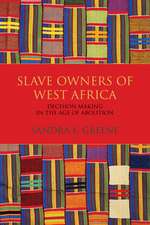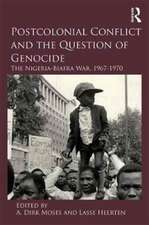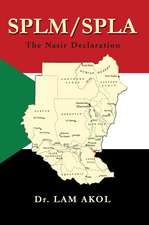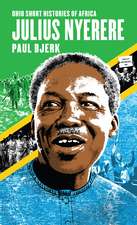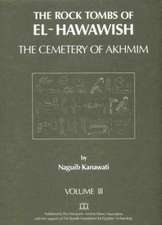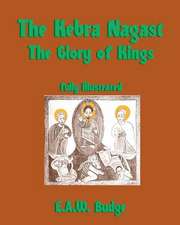Nigeria: A New History of a Turbulent Century
Autor Richard Bourneen Limba Engleză Paperback – 14 noi 2015
Seen from some angles, Nigeria is a remarkable success story: despite its poorly conceived colonial origins, the lingering damage of its colonial subjugation, tenacious civil war, wildly unequal economy, and the recent insurgency by Boko Haram, it has nonetheless remained one nation, growing in population and power, for more than a century now.
This new look at Nigeria traces the country’s history from its pre-colonial days as the home region to a number of distinct tribal powers through its definition by Britain as a single nation in 1914, to the hopeful early days of independence after World War II and the ongoing, often tragic disappointments of its governance and economic performance in the decades since. Richard Bourne pays particular attention to the failure to ensure that the wealth from Nigeria’s abundant oil, mineral, and agricultural resources is widely shared, and he offers an incisive analysis of the damaging effects that such gross inequality has on the nation’s stability and democratic prospects.
The most up-to-date and comprehensive analysis of Africa’s most important and populous nation in decades, this history—rooted in more than three decades of visiting and working in the country—will instantly be the standard account of Nigeria.
This new look at Nigeria traces the country’s history from its pre-colonial days as the home region to a number of distinct tribal powers through its definition by Britain as a single nation in 1914, to the hopeful early days of independence after World War II and the ongoing, often tragic disappointments of its governance and economic performance in the decades since. Richard Bourne pays particular attention to the failure to ensure that the wealth from Nigeria’s abundant oil, mineral, and agricultural resources is widely shared, and he offers an incisive analysis of the damaging effects that such gross inequality has on the nation’s stability and democratic prospects.
The most up-to-date and comprehensive analysis of Africa’s most important and populous nation in decades, this history—rooted in more than three decades of visiting and working in the country—will instantly be the standard account of Nigeria.
| Toate formatele și edițiile | Preț | Express |
|---|---|---|
| Paperback (1) | 136.27 lei 43-57 zile | |
| ZED BOOKS – 14 noi 2015 | 136.27 lei 43-57 zile | |
| Hardback (1) | 511.97 lei 43-57 zile | |
| ZED BOOKS – 14 noi 2015 | 511.97 lei 43-57 zile |
Preț: 136.27 lei
Preț vechi: 146.39 lei
-7% Nou
Puncte Express: 204
Preț estimativ în valută:
26.08€ • 27.13$ • 21.53£
26.08€ • 27.13$ • 21.53£
Carte tipărită la comandă
Livrare economică 14-28 aprilie
Preluare comenzi: 021 569.72.76
Specificații
ISBN-13: 9781780329062
ISBN-10: 1780329067
Pagini: 272
Dimensiuni: 127 x 229 x 30 mm
Greutate: 0.45 kg
Editura: ZED BOOKS
Colecția Zed Books
Locul publicării:London, United Kingdom
ISBN-10: 1780329067
Pagini: 272
Dimensiuni: 127 x 229 x 30 mm
Greutate: 0.45 kg
Editura: ZED BOOKS
Colecția Zed Books
Locul publicării:London, United Kingdom
Notă biografică
Richard Bourne is senior research fellow at the Institute of Commonwealth Studies, London University, and secretary to the Ramphal Institute in London. He is the author of Catastrophe: What Went Wrong in Zimbabwe?
Recenzii
“Writing about the diversity and complexity of governance in Nigeria poses a challenge. Richard Bourne has in this book tackled the challenge with detailed research and admirable perspicacity. Recommended reading for all those interested in Nigerian history.”
“This book is a major achievement and I defy anyone who reads it not to learn from it and gain greater understanding of the nature and development of a major African nation.”
“Richard Bourne's meticulously researched book is a major addition to Nigerian history.”
Cuprins
Glossary
Preface and acknowledgements
1914-1939: Invention of a country
1. Merger makes a large possession for Britain
2. First World War: Nigeria on the front line
3. Lugard struggles with opponents
4. Between the wars: Nigeria is not a single state
5. Between the wars: the economy in a world depression
6. Between the wars: a new assertive nationalism
1939-1964: Rocky road to freedom:
7. Another world war, and strategic importance
8. Political change, and divisive regionalism
9. Regional governments, and the coming of independence
10. Joy of independence
11. Overture to disaster
1964-1989: The shadow of generals
12. Military coups, Biafra, and civil war
13. Reconstruction, another coup, and the craving for democracy
14. A second republic, its short inglorious life, and overthrow
15. Buhari, IBB and a new military era
1989-2014: A decade of pain, then democracy a disappointment
16. Annulment of an election puts Nigeria on edge
17. The disastrous Abacha years
18. Democracy - and the return of Obasanjo
19. Yar’Adua, Jonathan and threats in the Delta and northeast
Reflections
Afterword
Preface and acknowledgements
1914-1939: Invention of a country
1. Merger makes a large possession for Britain
2. First World War: Nigeria on the front line
3. Lugard struggles with opponents
4. Between the wars: Nigeria is not a single state
5. Between the wars: the economy in a world depression
6. Between the wars: a new assertive nationalism
1939-1964: Rocky road to freedom:
7. Another world war, and strategic importance
8. Political change, and divisive regionalism
9. Regional governments, and the coming of independence
10. Joy of independence
11. Overture to disaster
1964-1989: The shadow of generals
12. Military coups, Biafra, and civil war
13. Reconstruction, another coup, and the craving for democracy
14. A second republic, its short inglorious life, and overthrow
15. Buhari, IBB and a new military era
1989-2014: A decade of pain, then democracy a disappointment
16. Annulment of an election puts Nigeria on edge
17. The disastrous Abacha years
18. Democracy - and the return of Obasanjo
19. Yar’Adua, Jonathan and threats in the Delta and northeast
Reflections
Afterword

